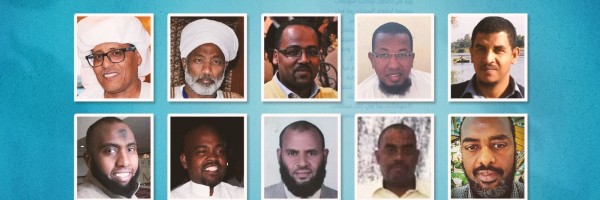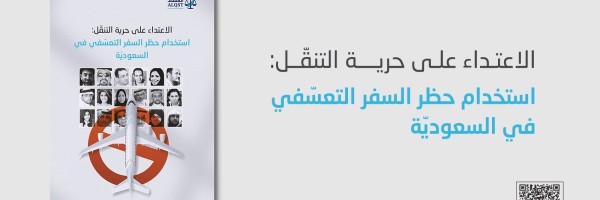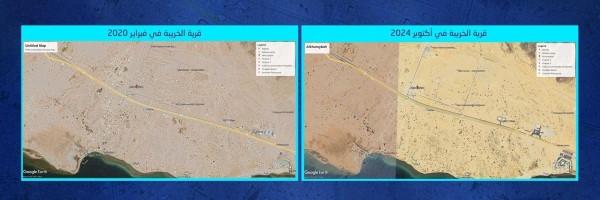On 2 November, which marks International Day to End Impunity for Crimes against Journalists, ALQST calls for an end to the ongoing persecution, imprisonment and silencing of journalists and writers in Saudi Arabia, and for the perpetrators of these crimes to be held to account.
As the human rights situation in Saudi Arabia has deteriorated in recent months, journalists continue to be viciously targeted. ALQST recently learned that in late 2021 the Supreme Court sentenced journalist Maha al-Rafidi to six years in prison, and a travel ban of the same length, for her activity on Twitter in support of human rights. She was initially sentenced by the Specialised Criminal Court (SCC) to five years in prison, half of it suspended. The amended sentence means that al-Rafidi, arrested in September 2019, is now not expected to be released until July 2025. News of her sentencing came amid a recent spate of unprecedented and extreme jail sentences being passed on peaceful activists in Saudi Arabia merely for exercising their right to freedom of expression.
Some prisoners of conscience in Saudi Arabia continue to be arbitrarily detained even after their prison sentences have already fully expired, including journalist Ahmad al-Sawian, arrested in September 2017 during a crackdown on dissent. Al-Sawian has completed a three-year sentence based on charges relating to free speech, and yet he is still behind bars.
Others detained long beyond their sentences’ expiry have eventually been released, but often only on stringent conditions such as arbitrary bans on travel, work and social media activity. On 3 February this year, journalist Fahad al-Suneidi, arrested on 11 September 2017, was released from prison approximately one year after his three-and-a-half-year sentence on charges relating to free speech had been completed. Journalists released in similar circumstances include Alaa Brinji, who is still under an eight-year travel ban.
Journalists and writers still serving lengthy sentences in Saudi Arabia for the peaceful exercise of their rights include Jordanian journalist Abdulrahman Farhana (jailed for 19 years), journalist Wajdi al-Ghazzawi (14 years), writer Abdullah al-Maliki (seven years), blogger and activist Fadhel al-Manasef (14 years), and blogger and economist Essam al-Zamel (15 years).
Others continue to be held in detention without being charged or brought to trial. Turki al-Jasser, another Saudi journalist, was arrested on 15 March 2018 in a security raid on his home and forcibly disappeared for more than 18 months, before being allowed to make a single phone call to his family in February 2020; he is still being held in detention, and continues to be denied any further contact with his family.
In September 2018, meanwhile, the Saudi authorities issued a summons on journalist Sultan al-Jumairi. Al-Jumairi, who was living in Canada at the time, was told he was not on any wanted list, but he was arrested immediately on arrival at the airport. It is still not known where he is being held, and no charges have been brought against him.
Journalist Zuhair Kutbi was arrested with excessive force on 10 January 2019 in a security raid on his home in Mecca. He was beaten and humiliated at Mansoura police detention centre. Kutbi was charged with sedition and undermining respect for the authorities. He remains in detention without having been brought to trial.
Such practices are grave violations of both international human rights standards and the kingdom’s own domestic laws. Under the Saudi Law of Criminal Procedure (LCP), the Public Prosecutor can extend pre-trial detention up to a maximum of six months in total, after which the detainee must be either released or brought to court. However, Article 19 of the Counter-Terrorism Law effectively removes this upper limit on pre-trial custody for those suspected of terrorist crimes.
ALQST believes that free journalism and media work acts as a safety valve in monitoring the performance of government bodies. It requires journalists to have a safe environment in which they can carry on their professional work without restrictions or harassment by the security forces, or the risk of being arrested, sent to prison, or even killed.
On 2 October 2018 the entire world was shocked by the murder of the veteran US-Saudi journalist Jamal Khashoggi in the Saudi consulate in Istanbul. There was huge disappointment among both media and human rights communities when the real culprit, Crown Prince Mohammed bin Salman, escaped punishment for the crime. Hopes of seeing him brought to justice seemed to have been finally dashed when a Turkish court decided in April 2022 to suspend the trial of 26 defendants in the case and transfer it to Saudi Arabia, given that on 7 September 2020 the Criminal Court in Riyadh had commuted death sentences for five of the 11 accused to lengthy prison terms, sentenced three other unnamed defendants to prison, and declared the case finally closed.
Meanwhile, on 19 July 2020 Saudi journalist Saleh al-Shehi died in mysterious circumstances just two months after being unexpectedly released from prison. Al-Shehi, a well-known newspaper columnist, was arrested in January 2018 and put on trial in the Specialised Criminal Court, where he was charged, convicted and sentenced in a single session, on 8 February, to five years in prison. He was charged with “insulting the royal court” after criticising Crown Prince Mohammed bin Salman’s so-called anti-corruption drive.
ALQST is deeply concerned by the Saudi authorities’ systematic targeting of journalists and writers, and urges them to respect the right to freedom of opinion and expression. It also urges the international community to invoke the laws protecting journalists to prosecute and punish all those implicated in crimes against journalists, no matter what public positions perpetrators hold.




